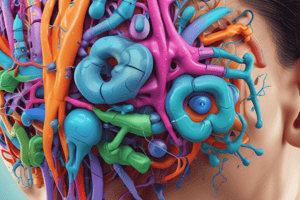Podcast
Questions and Answers
What is a recommended strategy for managing headaches effectively?
What is a recommended strategy for managing headaches effectively?
- Daily physical exercise
- Increasing caffeine intake
- Avoiding all physical activity
- Keeping a headache diary (correct)
Which of the following is a common manifestation associated with migraine headaches?
Which of the following is a common manifestation associated with migraine headaches?
- Bilateral pain
- Constant dull ache
- Gradual onset over days
- Severe, throbbing pain (correct)
What type of headache is associated with a visual disturbance as an early sign?
What type of headache is associated with a visual disturbance as an early sign?
- Tension headache
- Classic migraine (correct)
- Cluster headache
- Without aura migraine
Which factors are considered risk triggers for migraines?
Which factors are considered risk triggers for migraines?
What is a symptom commonly found during the prodromal stage of migraines?
What is a symptom commonly found during the prodromal stage of migraines?
In what way does the second stage of a classic migraine typically manifest?
In what way does the second stage of a classic migraine typically manifest?
Which statement describes an aura in relation to migraines?
Which statement describes an aura in relation to migraines?
What common symptom is associated with cluster headaches?
What common symptom is associated with cluster headaches?
Flashcards
Migraine Headache Types
Migraine Headache Types
Migraines are categorized by the presence or absence of aura (sensory disturbances) before the headache, and can be classified as with aura (classic migraine) or without aura (common migraine), as well as atypical. Status migrainosus is a longer-lasting type.
Migraine with Aura (Classic Migraine)
Migraine with Aura (Classic Migraine)
A type of migraine that includes sensory disturbances (aura) before the headache. These disturbances can last minutes to an hour and include visual changes, numbness/tingling, or confusion.
Migraine without Aura (Common Migraine)
Migraine without Aura (Common Migraine)
A type of migraine that does not include aura before the headache. The pain is often unilateral, throbbing and worsened with physical activity.
Status Migrainosus
Status Migrainosus
Signup and view all the flashcards
Migraine Triggers
Migraine Triggers
Signup and view all the flashcards
Migraine Headache Symptoms
Migraine Headache Symptoms
Signup and view all the flashcards
Migraine Pain Stages
Migraine Pain Stages
Signup and view all the flashcards
Visual Migraine (Older Adults)
Visual Migraine (Older Adults)
Signup and view all the flashcards
Study Notes
Headache Management and Prevention
-
Stress Management Strategies: Promote techniques to manage stress and recognize triggers for headaches.
-
Headache Diary: Encourage use of a headache diary to identify headache type and response to interventions.
-
Hand Hygiene: Promote hand hygiene to prevent virus spread (symptoms similar to the common cold).
-
Pain Management: Review both over-the-counter medications and herbal remedies for pain relief.
Headache Triggers
-
Alcohol and Environmental Allergies: Possible triggers for headaches.
-
Intense Odors and Bright Lights: Potential headache triggers.
-
Medication Overuse: Excessive use of certain medications can trigger a headache.
-
Fatigue, Sleep Deprivation, and Stress: Factors that can cause headaches.
-
Emotional or Physical Stress: Stress is a significant headache trigger.
-
Hormone Fluctuations: Hormonal changes (menstruation, birth control pills) can trigger headaches.
-
Certain Foods: Avoid foods with tyramine, nitrites, or dairy for possible headache triggers.
Migraine Headaches
-
Assessment: A thorough assessment considers photophobia, phonophobia, nausea, vomiting, stress, and unilateral pain.
-
Health History: Important to investigate personal and family history concerning headache patterns.
-
Activity of Daily Living (ADLs): Assess any alterations in ADLs lasting 4–72 hours related to headache.
-
Classifications and Stages: Migraines are categorized and staged.
Migraine with Aura
-
Prodromal Stage: Symptoms (irritability, cravings) that occur hours or days before the headache.
-
Aura Stage: Neurologic symptoms (numbness, tingling, visual disturbances) develop over minutes to an hour.
-
Second Stage: Severe, incapacitating throbbing headache, often with nausea, vomiting, drowsiness, and vertigo.
-
Third Stage: Headache is dull, pain and aura subside, muscle aches, and possible neck stiffness are common.
-
Visual Migraine (Older Adults): Potential for aura without pain.
Migraine without Aura
-
Characteristics: Pain is worse with physical activity; unilateral, pulsating pain; and/or photophobia, phonophobia, nausea, or vomiting may be present.
-
Duration: Usually 4–72 hours. Often occurs in the morning, stressful periods, or premenstrual tension (fluid retention).
Other Migraine Types
-
Status Migrainous: Lasts longer than 72 hours.
-
Migrainous Infarction: Neurological symptoms persist for 7 days, neuroimaging indicates possible ischemic stroke.
-
Atypical/Unclassified: Does not fit other criteria.
Studying That Suits You
Use AI to generate personalized quizzes and flashcards to suit your learning preferences.




